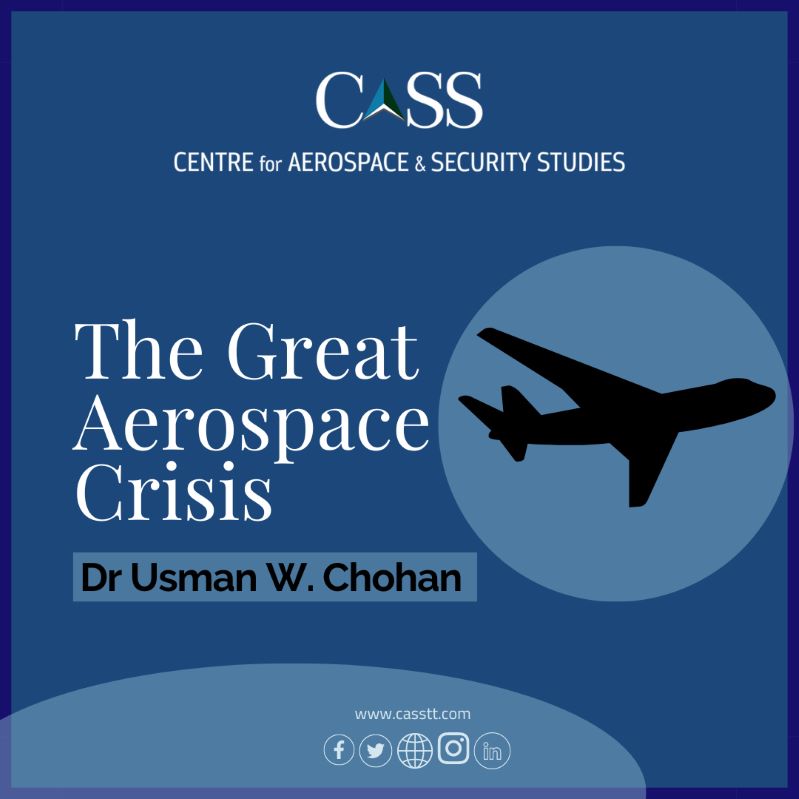Observers of the coronavirus (Covid-19) pandemic have already ascribed many monikers to the economic crisis that has sprung in the contagion’s wake. While each speaks to the destruction and paralysis that the world economy faces, they all allude to varying aspects of the collective crisis: Great Lockdown; Covid Depression; and Corona-Recession already being some of the most popular.
Given the multifaceted nature of the pandemic’s economic tremors, another name that warrants mention in the list is the “Great Aerospace Crisis,” because perhaps more than any other economic sector, international aerospace activity has been disproportionately haemorrhaged by coronavirus.
The aerospace sector has been “brought down to earth” by the worldwide contagion in large part to the collapse of international passenger traffic through a set of global quarantines that have affected an estimated 2.3 billion people for different intervals since the beginning of 2020. Confinement precludes flight, and air traffic has virtually grounded to a halt as a result.The ramifications for the aerospace sector are immense. According to IATA, which acts as the global trade body for the aviation industry, more than 25 million jobs in both the aerospace and aviation sectors face a grave risk without large-scale government interventions in the form of rescue packages.
Brian Burridge, who is the chief executive of the Royal Aeronautical Society, suggests that the Global Aerospace Crisis will last several years and might shrink the airline ecosystem by 50%. In his words, “out of the world’s nearly 1,000 airlines, a lot are just bubbles of debt with wings,” such that some airlines will face shrinkages, and others outright collapse. Burridge came to Pakistan in early March, 2020, to speak at the Centre for Aerospace and Security Studies’ (CASS) international conference titled “Global Strategic Threat and Response.”
The large aerospace giants are haemorrhaging cash throughout this lockdown phase, and according to the CEO of Delta Airlines, the largest carrier in the world, the current grounding of 600 aircraft is resulting in a loss of $60m per day. On the other side of the Atlantic, the second quarter of 2020 will likely result in a 90 per cent loss in capacity for European airlines if current restrictions continue. Because of this, estimates of the annual revenue passenger kilometres (RPKs) for the continent’s aviation industry are to decline by at least 55 per cent.In a recent conference call, the CEO of Airbus has cautioned that the aviation industry could take as between three to five years to recover to levels seen before Covid-19. In the first quarter of calendar year 2020, Airbus was unable to deliver 60 planes to customers due to quarantine restrictions. Its downstream customers, including British Airways, have announced job cuts in the tens of thousands, due the drop in passenger demand.
It is striking to see how rapid the collapse of the aerospace sector has been. As recently as February, 2020, the global aerospace giants Boeing and Airbus had confidently predicted demand for more than 40,000 aircraft worth nearly $7 trillion over the next two decades years. Indeed, the recent trends in aviation and aerospace had shown great promise, and the consensus was for a steady increase in global air traffic due to heightened demand from emerging markets.
Yet many airlines now face imminent bankruptcies, as the now widely touted Virgin Australia case shows where the public hostility to the airline, specifically its flamboyant billionaire-owner Richard Branson, made a bailout politically unfeasible. In addition, there is the controversy regarding tax evasion by airlines and cruise companies, who register themselves in tax havens – Virgin may qualify for government assistance in UK but not Australia.
However, the aerospace and airline industries should not be dismissed out of hand for fiscal rescue, despite the profligacy of their executives (particularly in Western countries such as the United States and Australia), where they have shamelessly paid themselves enormous bonuses via stock buyback inflation in recent years while failing to save for a rainy day.
The economic potency of the aerospace industry must be kept in mind. It pays above-average wages, fosters technological innovations, and allows aerospace-exporting countries to generate healthy trade surpluses. In 2018, the EU aerospace sector earned €94 billion, and was thus responsible for the most significant share of the EU’s high-tech exports. Meanwhile, US civil aerospace exports were worth $122 billion, also helping to alleviate some of the pressure from the US’s widening trade deficit.
While there are few silver linings due to both the severity of the coronavirus pandemic and the unpredictability of its duration, one important point that aerospace companies are highlighting is the “opportunity” that the lockdown provides for a transition to newer planes that have lower carbon emissions. If anything, this can help the sector to address the potentially greater long-term challenge of achieving carbon neutrality.Nevertheless, the Great Aerospace Crisis is likely to be one of the most glaring examples of wanton destruction wrought by the coronavirus pandemic, and it is one of the sectors that confronts the most far-reaching economic impact that is likely to felt over an extended horizon.
– The writer is the Director for Economics and National Affairs at the Centre for Aerospace and Security Studies (CASS). This article was first published in The Nation newspaper. He can be reached at [email protected].





